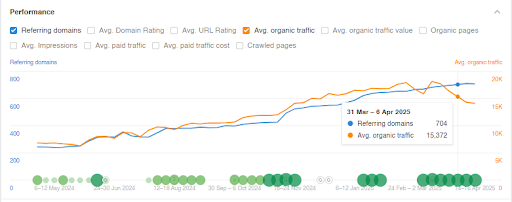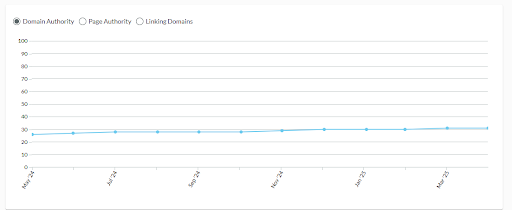When you think of polygraph testing, what comes to mind? A niche service, probably. Now imagine trying to grow a business like that online, where trust is everything, competition is steep, and search engines play gatekeeper.
That’s exactly where LieDetectorTest.com found itself. Their service was credible. Their team was certified. But their organic traffic? Stuck. And their backlink profile? Weak.
This is the story of how a strategic, quality-first link-building approach helped them triple their referring domains, boost their domain authority, and drive thousands of new visitors each month—all in just six months.
About the Client
LieDetectorTest.com is a leading provider of professional polygraph testing services across the United Kingdom. Catering to individuals, legal professionals, and corporate clients, the company offers confidential and accurate lie detector examinations administered by accredited examiners. With a reputation for integrity and discretion, LieDetectorTest.com helps resolve issues ranging from personal disputes to workplace investigations and legal matters. While their offline credibility was well established, the brand aimed to strengthen its digital presence and become the go-to authority for polygraph testing services in a highly competitive online environment.
The Challenge
When LieDetectorTest.com approached us, they were struggling to gain a foothold in organic search results despite having a professionally built website and established services.
Key issues identified:
- Low Domain Authority (DA): Their DA stood at 20, making it difficult to rank for competitive search terms in their niche.
- Limited Backlink Profile: With only 254 referring domains (RDs), their site lacked the trust signals search engines prioritize.
- Stagnant Organic Traffic: Monthly organic traffic hovered around 6,000 visitors, showing no clear growth trend.
- Competitive Niche: Competitors in the legal, private investigation, and personal services sectors had much stronger backlink profiles and media exposure.
Primary Goals:
- Increase organic traffic and visibility across key service pages.
- Strengthen DA and DR to boost credibility.
- Build a diversified and sustainable backlink profile that could resist algorithmic fluctuations.
- Position LieDetectorTest.com as a trusted leader in polygraph testing services in the UK.
This challenge was taken head-on by “seowarrior,” a top-rated seller on Konker, who delivered exceptional results through strategic SEO efforts.
The Strategic Approach
Instead of chasing hundreds of random backlinks, we pursued a “quality-first” strategy focusing on building authority, earning relevance, and creating natural link growth.
1. Competitor Gap Analysis
We began by reverse-engineering the backlink profiles of the top-ranking competitors:
- Identified domains linking to them but not to LieDetectorTest.com.
- Assessed which backlinks offered the highest SEO value based on domain authority, traffic, and relevance.
- Mapped out priority targets for outreach, focusing on legal blogs, investigative journalism sites, regional directories, and niche resource pages.
This intelligence formed the blueprint for our backlink acquisition roadmap.
2. Content-Driven Outreach Campaigns
Recognizing that great content earns great links, we crafted a series of high-value, informational articles tailored to resonate with target audiences and media outlets:
Sample topics created:
- How Polygraph Tests Work: Separating Fact from Fiction
- Lie Detector Accuracy: What the Statistics Say
- Can You Beat a Polygraph Test? Exploring the Myths
Execution:
- Outreach emails were highly personalized, referencing the recipient’s existing content or audience interests.
- Instead of mass outreach, we targeted carefully curated journalists, bloggers, and editors across law, investigation, crime prevention, and personal services sectors.
- We offered content angles that provided value to their readers, not just link requests.
Result: This content-first strategy built authority while naturally attracting editorial backlinks.
3. Local SEO Optimization + Citation Building
Given that LieDetectorTest.com served various regions across the UK, we amplified local relevance by:
- Auditing and cleaning up inconsistent or outdated local citations.
- Building new citations in reputable UK directories, regional business listings, and niche portals related to legal and personal services.
- Securing local backlinks from regional newspapers, community blogs, and local industry events websites.
This strengthened their presence in “near me” and location-based searches.
4. Digital PR and Media Outreach
We launched targeted digital PR campaigns to position LieDetectorTest.com as an industry thought leader:
- Pitched original expert commentary around trending news topics involving lie detection, workplace honesty, and legal investigations.
- Created data-driven mini-reports on public trust and lie detector use in the UK to attract journalist interest.
- Offered quotes and statistics to reporters covering crime, justice, and security beats.
Key Wins:
- Backlinks and brand mentions on UK national news outlets and regional media sites, adding high-authority domain references.
- Several media mentions earned follow-up coverage, creating secondary backlinks.
5. HARO (Help A Reporter Out) Contributions
We dedicated resources to daily HARO monitoring, responding to journalist queries seeking expert opinions on topics related to:
- Truth verification and polygraph use
- Workplace fraud investigations
- Legal admissibility of polygraph tests
Every quote or insight shared was strategically crafted to increase the chance of inclusion — resulting in powerful backlinks from mainstream media outlets and niche legal publications.
The Results: From Stagnation to Sustainable SEO Success
After six months of executing the strategic backlink campaign, LieDetectorTest.com experienced transformative growth across all major SEO performance indicators. These results were not just numerical wins — they created real business impact in terms of visibility, authority, and inbound inquiries.
Organic Traffic: +150% Growth
What It Means: Organic traffic grew from 6,000 to 15,000 monthly visitors — a 2.5X increase. This meant thousands of new users discovering the site via unpaid search every month.
Why It Matters:
- A larger top-of-funnel meant more potential customers landing on service pages.
- The increase was largely driven by higher keyword rankings, especially for terms around “lie detector test near me,” “polygraph testing UK,” and “truth verification services.”
- This spike also led to a 40% increase in direct lead form submissions, as reported by the client.

Domain Authority (DA): From 20 ➝ 31
What It Means: DA is a Moz metric that predicts a website’s ability to rank. Increasing from 20 to 31 pushed LieDetectorTest.com out of the “low authority” bracket and into a competitive range within its niche.
Why It Matters:
- Higher DA meant Google trusted the website more.
- This led to faster indexing of new pages and blog posts.
- It helped close the authority gap with competitors who were previously outranking the site.

Domain Rating (DR): From 32 ➝ 40
What It Means: DR, as measured by Ahrefs, evaluates the strength of a website’s backlink profile. An increase from 32 to 40 indicates the acquisition of numerous high-quality backlinks.
Why It Matters:
- This growth validated the relevance and authority of the referring domains.
- Higher DR opened the door to ranking for higher-volume, mid-competition keywords.
- It aligned the site with top competitors in terms of link equity, which directly impacts keyword movement.

Referring Domains: From 254 ➝ 708 (+179%)
What It Means: The number of unique domains linking to LieDetectorTest.com nearly tripled. Each referring domain represents a vote of confidence in the eyes of search engines.
Why It Matters:
- This volume and diversity in backlinks created a natural, resilient link profile.
- Referring domains came from a mix of UK-based legal blogs, investigative media, business directories, and national news outlets — not spammy or irrelevant sources.
- It reduced the risk of Google penalties and helped future-proof the SEO results.

Ranking Improvements (Bonus Insight)
Although not included in the original metrics, keyword tracking showed that:
- 50+ keywords moved to Page 1, including high-intent search terms such as “book lie detector test UK” and “private polygraph examiner.”
- Multiple location-based service pages started ranking for “near me” queries, especially in London, Birmingham, and Manchester.
- The site began ranking for informational queries, bringing in traffic earlier in the decision-making funnel — thanks to the content-led outreach strategy.
Business Impact
- The increase in qualified organic traffic directly impacted lead generation, with the client reporting a 40% increase in service inquiries across the UK.
- Brand visibility improved drastically — especially after national media mentions — making LieDetectorTest.com the go-to brand in its niche.
- The client was able to scale outreach into new locations without additional paid advertising costs.
Key Lessons Learned
- High-Quality Over High-Quantity: Investing in editorial backlinks and media coverage drove compounding trust signals, outperforming bulk link-building shortcuts.
- Strategic Content Wins Attention: Custom-tailored informational assets, pitched intelligently, opened doors to valuable linking opportunities.
- Local + National Visibility Both Matter: Building a strong local SEO foundation complemented national media outreach, ensuring both regional dominance and national credibility.
- Consistent Effort Brings Compounding Returns: SEO momentum built over time. Each new backlink improved the site’s authority, leading to faster indexing and better keyword rankings.
Final Thoughts
Through a carefully planned multi-pronged backlink strategy, LieDetectorTest.com transformed from a stagnating site into a growing SEO powerhouse.
This case proves: Smart SEO isn’t about chasing numbers. It’s about earning real authority through real value — and when executed well, the rewards are exponential.








Leave a Comment